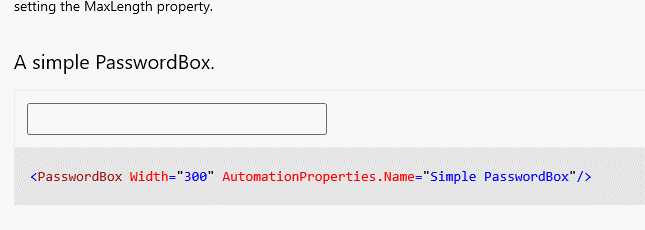UWP 自定义密码框控件
Posted hupo376787
tags:
篇首语:本文由小常识网(cha138.com)小编为大家整理,主要介绍了UWP 自定义密码框控件相关的知识,希望对你有一定的参考价值。
1. 概述
微软官方有提供自己的密码控件,但是控件默认的行为是输入密码,会立即显示掩码,比如 *。如果像查看真实的文本,需要按查看按钮。
而我现在自定义的密码控件是先显示你输入的字符2s,然后再显示成掩码。当然这种场景并不一定适用于密码,也可以用在Pin码。
a. 微软官方的密码框

b. 自定义的效果

2. 密码框控件实现
要想实现自定义的密码框,我们当然要继承微软的TextBox控件,然后加入我们自己需要的东西。
a. 这里添加了一个加密类型的密码 Password 字段,真实密码文本 RealPassword 字段,一个Timer定时器来控制显示掩码
internal class CustomPasswordBox : TextBox { #region Member Variables public static readonly DependencyProperty PasswordProperty = DependencyProperty.Register("Password", typeof(SecureString), typeof(CustomPasswordBox), new PropertyMetadata(new SecureString())); public static readonly DependencyProperty RealPasswordProperty = DependencyProperty.Register("RealPassword", typeof(string), typeof(CustomPasswordBox), new PropertyMetadata(string.Empty)); private DispatcherTimer maskTimer; #endregion }
b. 公开控件属性字段
public SecureString Password { get { return (SecureString)GetValue(PasswordProperty); } set { SetValue(PasswordProperty, value); } } public string RealPassword { get { return (string)GetValue(RealPasswordProperty); } set { SetValue(RealPasswordProperty, value); } }
c. 然后再构造函数里添加一个需要相应的事件,还有初始化Timer
public CustomPasswordBox() { PreviewKeyDown += CustomPasswordBox_PreviewKeyDown; CharacterReceived += CustomPasswordBox_CharacterReceived; BeforeTextChanging += CustomPasswordBox_BeforeTextChanging; SelectionChanged += CustomPasswordBox_SelectionChanged; ContextMenuOpening += CustomPasswordBox_ContextMenuOpening; TextCompositionStarted += CustomPasswordBox_TextCompositionStarted; maskTimer = new DispatcherTimer { Interval = new TimeSpan(0, 0, 2) }; maskTimer.Tick += MaskTimer_Tick; }
在PreviewKeyDown、CharacterReceived、BeforeTextChanging这三个事件里,主要处理字符的输入删除等逻辑。
在SelectionChanged事件里,我们主要处理不让用户选中文本
在ContextMenuOpening,主要是屏蔽右键菜单,比如复制剪切粘贴
在TextCompositionStarted主要屏蔽中文等组合输入法
另外,在我的场景里面,我们只让用户输入数字,所以加入了数字验证,以及在Xbox上开启了InputScope=NumbericPin模式。
d. 添加事件响应代码
private void CustomPasswordBox_PreviewKeyDown(object sender, Windows.UI.Xaml.Input.KeyRoutedEventArgs e) { switch (e.OriginalKey) { case VirtualKey.Back: case VirtualKey.Delete: if (SelectionLength > 0) { RemoveFromSecureString(SelectionStart, SelectionLength); } else if (e.OriginalKey == VirtualKey.Delete && SelectionStart < Text.Length) { RemoveFromSecureString(SelectionStart, 1); } else if (e.OriginalKey == VirtualKey.Back && SelectionStart > 0) { int caretIndex = SelectionStart; if (SelectionStart > 0 && SelectionStart < Text.Length) caretIndex = caretIndex - 1; RemoveFromSecureString(SelectionStart - 1, 1); //SelectionStart = caretIndex; } e.Handled = true; break; default: //e.Handled = true; break; } } private void CustomPasswordBox_CharacterReceived(UIElement sender, Windows.UI.Xaml.Input.CharacterReceivedRoutedEventArgs args) { if (!char.IsDigit(args.Character)) return; AddToSecureString(args.Character.ToString()); args.Handled = true; } private void CustomPasswordBox_BeforeTextChanging(TextBox sender, TextBoxBeforeTextChangingEventArgs args) { args.Cancel = args.NewText.Any(c => !char.IsDigit(c) && !char.ToString(c).ToString().Equals("●")); //if (args.NewText.Replace("●", "") != "") // AddToSecureString(args.NewText.Replace("●", "")); } private void CustomPasswordBox_ContextMenuOpening(object sender, ContextMenuEventArgs e) { e.Handled = true; } private void CustomPasswordBox_SelectionChanged(object sender, RoutedEventArgs e) { SelectionStart = Text.Length; SelectionLength = 0; } private void CustomPasswordBox_TextCompositionStarted(TextBox sender, TextCompositionStartedEventArgs args) { return; } private void MaskTimer_Tick(object sender, object e) { MaskAllDisplayText(); }
e. 实现Timer里面的2s后将字符串变成掩码
2s后看TextBox里面的字符数,然后设置对应长度的掩码
private void MaskAllDisplayText() { maskTimer.Stop(); int caretIndex = SelectionStart; Text = new string(‘●‘, Text.Length); SelectionStart = caretIndex; }
f. 添加字符和删除字符
private void AddToSecureString(string text) { if (SelectionLength > 0) { RemoveFromSecureString(SelectionStart, SelectionLength); } if (Password.Length >= 4 || RealPassword.Length >= 4) return; foreach (char c in text) { System.Diagnostics.Debug.WriteLine(text); int caretIndex = SelectionStart; if (caretIndex - 1 < 0) Password.InsertAt(0, c); else Password.InsertAt(caretIndex - 1, c); RealPassword += c.ToString(); //MaskAllDisplayText(); if (caretIndex == Text.Length) { maskTimer.Stop(); maskTimer.Start(); //Text = Text.Insert(caretIndex++, c.ToString()); } else { //Text = Text.Insert(caretIndex++, "●"); } SelectionStart = Text.Length; } } private void RemoveFromSecureString(int startIndex, int trimLength) { int caretIndex = SelectionStart; for (int i = 0; i < trimLength; ++i) { Password.RemoveAt(startIndex); RealPassword = RealPassword.Remove(startIndex, 1); } Text = Text.Remove(startIndex, trimLength); SelectionStart = caretIndex; }
3. 控件使用方法
<local:CustomPasswordBox InputScope="NumericPin" MaxLength="4" />
一个例子
<Grid>
<local:CustomPasswordBox
x:Name="PSW"
InputScope="NumericPin"
Padding="200 0 0 0"
Style="{StaticResource MyTextBox}"
Height="Auto"
MaxLength="4"
CharacterSpacing="1000"
FontSize="100"
VerticalAlignment="Top"/>
<TextBlock
x:Name="realPSW"
FontSize="88"
Margin="0 200"
HorizontalAlignment="Center"
Text="{Binding ElementName=PSW, Path=RealPassword, Mode=OneWay}"/>
</Grid>
你也可以看我在Youtube上的视频演示
欢迎点击右下角的订阅按钮,还有红色小铃铛。谢谢

以上是关于UWP 自定义密码框控件的主要内容,如果未能解决你的问题,请参考以下文章